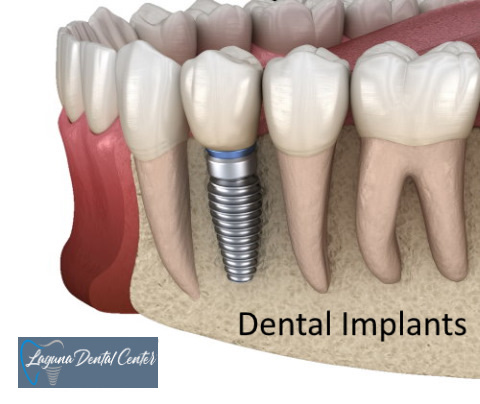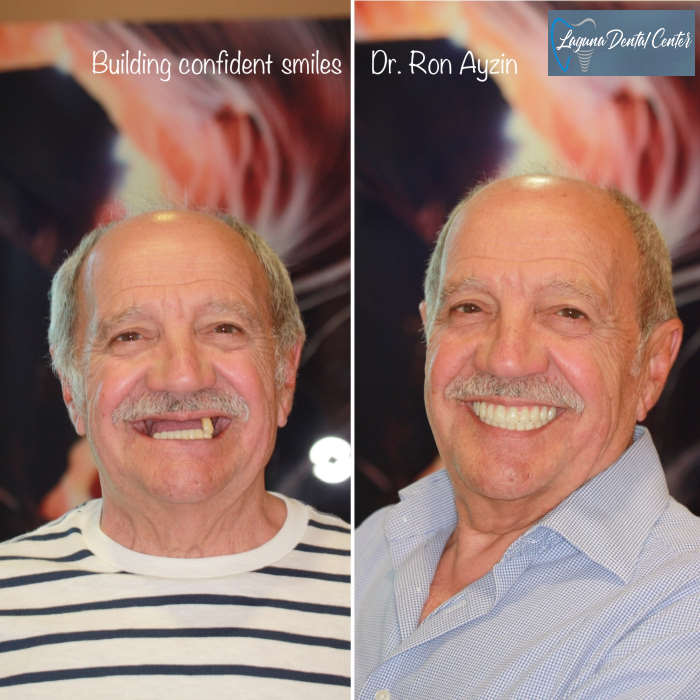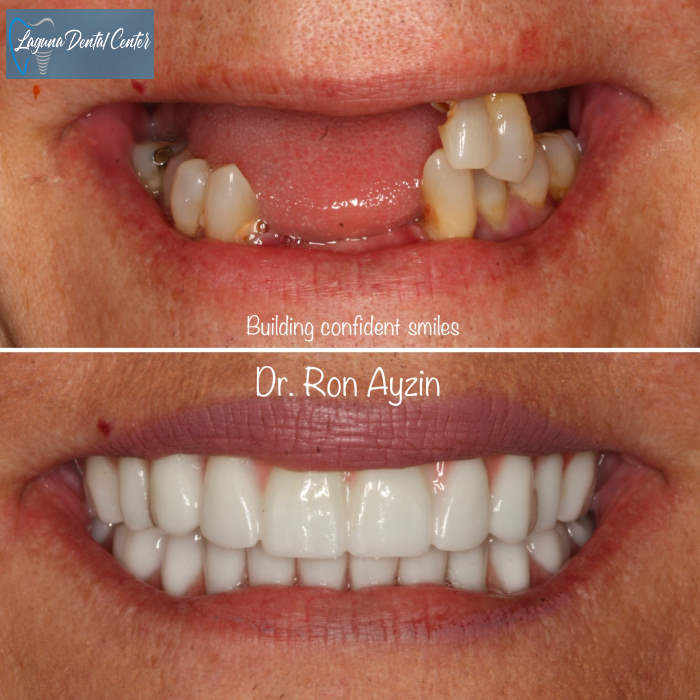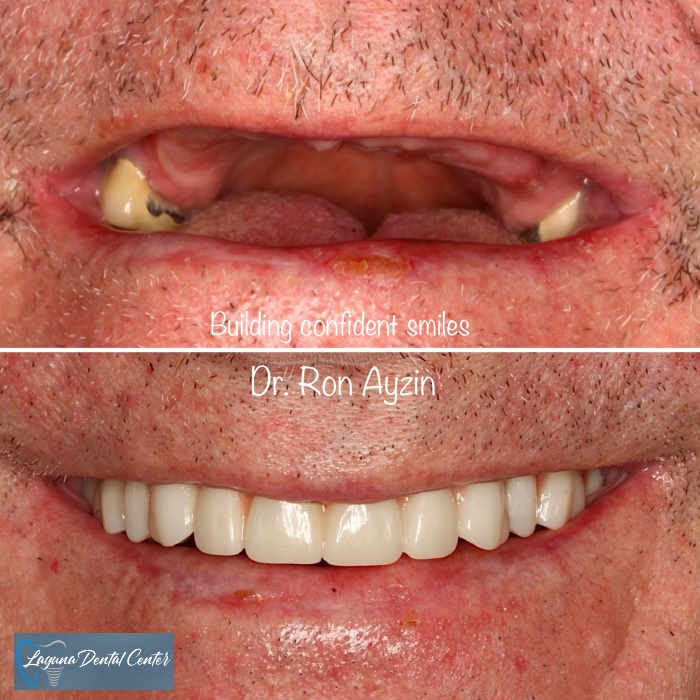Table of Contents

What is a Dental Implant?
A dental implant is an artificial tooth root made of metal. Dental implants are available in various forms and sizes (diameter & length). Most dental implants are composed of titanium, however, some are also constructed of zirconia. By adhering to the correct diagnostic and surgical procedures, this titanium screw is fastened to the jawbone painlessly. Osseointegration is the process by which a dental implant heals and fuses with the jawbone after being implanted. A Dental Crown will be positioned after they have effectively integrated into the jaw, which takes three to six months.
What are the Different Types of Dental Implants?
There are several different kinds of tooth implants. The most prevalent implants, according to the American Academy of Implant Dentistry (AAID), are endosteal and subperiosteal implants.
- Directly inserted into the jawbone are endosteal implants, often known as root implants. They are the most common kind of dental implant; they are typically composed of titanium and shaped like small screws.
- Subperiosteal implants are positioned on or above the jawbone but below the gum line. This kind of implant may be advantageous for a patient who lacks a strong jawbone to support the implant and who cannot or does not choose to undergo bone augmentation surgery.
What Are The Steps for Dental Implant Placement?
Step 1: Bone Grafts, Gums, and Evaluation for Dental Implant

You may choose from a range of bone grafting products at our office. Before your procedure, Dr. Ronald Ayzin DDS will discuss all of them with you. After the bone graft is inserted, it must heal for six to nine months before the implant may be inserted.
Step 2: Titanium Post Placement for Dental Implant
Depending on how many teeth need to be replaced, pressure-controlled drills are utilized to embed one or more titanium posts into the jawbone during dental implant surgery. Platform switching, which uses implants with a tiny diameter to preserve the alveolar bone levels around the posts, may be advised.
Step 3: Healing Period for Dental Implant
You should anticipate experiencing some soreness and swelling after the placement of the dental implant. This might last for a few of days. It might take two to six months for sufficient new bone to grow around the screw. Osseointegration, which means “combining with the bone,” is the name of this procedure. Around the implant, the jawbone will grow and become stronger. This fixes it in place and enables it to act as the root of the prosthetic tooth.
Step 4: Abutment and Crown Fabrication for Dental Implant
After the healing period, you may proceed to the implantation of the abutment, which is the following phase in the dental implant process. A metal extension called an Abutment is often fastened to the Implant. It’s necessary to make sure the crown is firmly fixed and cannot be readily removed by biting forces. The gums need a few weeks to heal once the Abutment is implanted.
An incision can be needed if gum tissue has developed above the implant. This is because once the dental implant has been placed, a healing cap is put on top of it to aid in the repair of the gum tissue around it. The implant is protected in this way. It cannot stop gum tissue from growing over it, however. During the second procedure, the healing cap will be taken off, and the dental implant will then have the abutment attached. After that, the gum tissue will create a barrier that will protect the Abutment.
In the meanwhile, Crowns will be made in a lab using CAD/CAM technology. After the wound has fully healed, this state-of-the-art technology will produce a custom dental crown that is prepared for attachment to the abutment. Either dental cement or a straight screw may be used to secure the Crown to the Abutment. It should have a minimum Crown-to-Root Ratio of 1:2.
Before and After Pics of Dental Implants| Laguna Dental Center in Laguna Hills
At Laguna Dental Center, Dr. Ronald Ayzin, can help you lower the cost of your Dental Implants.
- FREE Dental Implant Smile Consultation ($100 Value)
- FREE Digital X-rays especially for Tooth Implant ($150 Value)
- We maximize your insurance, so you pay less out of pocket.
Contact Us:
Am I a good Candidate for Dental Implants?

When is a Tooth Implant Not Recommended?
Patients who have periodontal disease or other gum conditions like gingivitis may not be good candidates for implant surgery. Smokers and other tobacco users are also not excellent candidates for this treatment since nicotine and smoking both slow down the healing process in the mouth, increasing the likelihood of osseointegration failure.
Our implant dentist may provide alternatives if you aren’t a suitable candidate for dental implants. Dr. Ronald Ayzin DDS At your first appointment, will do an oral examination, assess your medical history, and talk about your unique objectives, enabling you to make an informed choice about your dental health.
How Painful is a Dental Implant Procedure?
Dr. Ronald Ayzin DDS will make use of both sedative medications and local anesthetics to keep you calm and at ease during the Dental Implant operation. When the numbness wears off, patients could feel uncomfortable or in pain, and there might even be swelling. Nevertheless, painkillers will be given to you to assist manage your discomfort at the Implant site. Additionally, restorative post-operative techniques including elevating the head, using cold packs, and utilizing warm salt water rinses will be advised. A single implant will often be less uncomfortable than an operation involving many implants. Patients often have discomfort for up to 10 days after the procedure, while it sometimes goes gone earlier.
You need to contact our dental office immediately if, after 10 days, you’re still in agony or discomfort. Long-lasting discomfort could be a sign that the implant site is contaminated. If that’s the case, we need to find a solution very once if we want to keep the Implant.
What Results Can be Expected From Dental Implants?
If the osseointegration was effective and the gum tissues and jawbone fully healed, you may anticipate having permanent teeth that are just as durable as your natural teeth.
Contrary to dentures, dental implants are permanently inserted, therefore there won’t be any unpleasant slippage.
You can expect to have permanent teeth that are as durable as your natural teeth if the osseointegration was effective and the gum tissues and jawbone fully healed. As long as you practice good oral hygiene and have biannual dental exams, a dental implant may endure for decades or even a lifetime. The crown, however, could need to be changed since it only normally lasts for ten to fifteen years.
What Are the Advantages of Dental Implants?
- Dental implants mimic the appearance of real teeth.
- Teeth Implants can last a lifetime.
- Bone loss is prevented with dental implants.
- The neighboring teeth from your missing teeth will become stable thanks to tooth implants.
- The neighboring teeth from your missing teeth will become stable thanks to tooth implants.
- Dental implants stop premature aging and facial drooping.
- Contrary to dentures, dental implants are permanently inserted, therefore there won’t be any unpleasant slippage.
- Dental Implant care is easy.
- You’ll be able to talk normally thanks to dental implants.
- The success rate of dental implant surgery is high.
What Are the Disadvantages of Dental Implants?
- Not everyone is a good candidate for dental implants.
- There is a good probability that your dental insurance will not cover dental implants since they may be fairly pricey.
- Surgery is required in order to perform tooth implants.
- Dental implants are built to last a lifetime, but the crowns you attach to them could not. Another drawback of them is the potential for needing to replace them in the future due to their high cost.
- Healing from dental implants is a lengthy process.
Is Dental Implant safe and what is the success rate of Dental Implant?
Because this procedure has been used successfully in dentistry for more than 30 years, dental implants are thought to be generally risk-free dental equipment. They have great success rates, and according to other research, after a period of 40–50 years, the success rate is between 95 and 98 percent. Like any other treatment, the safety and success of implant dentistry depends on the patient’s dental health as well as the ability, experience, and knowledge of the implant dentist. At Laguna Dental Center, however, you won’t have to be concerned since Dr. Ronald Ayzin DDS has extensive training in the surgical installation of dental implants and is aware of the need of carefully assessing each patient’s suitability for dental implants before surgery. Dr. Ronald Ayzin DDS adheres to the strictest moral and ethical standards at all times throughout the implantation and repair process.
What treatment options are available for Dental implants?
Full Mouth Dental Implants
Dental Implant in a Day (Same Day Dental Implants)
Same-day Dental Implants may often be accomplished in a single session lasting anywhere from 30 minutes to 3 hours, depending on the number of implanted teeth. An initial appointment to see whether you’re a suitable candidate for same-day dental implants, the actual operation, and a check-up thereafter are all part of the process. However, your implant dentist will only need to schedule one visit for the actual implant operation. Nevertheless, your gums and jaw still require some time to recover before acquiring crowns. Temporary teeth will be given to you on the day of your procedure. After your mouth has fully healed, permanent teeth will be given to you in lieu of temporary ones.
How Much do Dental Implant Cost?
Dental implants cost between $3,000 and $4,500. Same Day Dental Implants costs between $4,000 and $5,000 per implant. The cost of multiple implants may vary from $1,500 to $30,000, full mouth implants can cost between $50,000 and $90,000, and all-on-four implants can cost between $24,000 and $50,000.
FAQs for Dental Implants
How long does a Dental Implant last?
The purpose of a dental implant is to serve as a long-term tooth replacement. The jaw post made of titanium may endure for practically a lifetime. If taken care of and maintained correctly, the Abutment and Crown may endure 15 to 25 years. Your dental implants will be made to last a lifetime by our practice.
Do gums grow around Implants?
Yes, the gums surrounding the implant do grow. With the use of a technique called gum contouring, the gums may be made to resemble the healthy gums that surround the teeth in size and form. To prevent the gum from covering the implant after the titanium tooth root has been inserted, a healing cap or temporary crown is put in place. In order to monitor the healing process and progressively sculpt the gums around the implant to the desired form, the patient will return to the clinic while the implant is healing. This makes the replacement teeth and gums as natural-looking as feasible.
Areas We Serve:
Our office serves the following communities.




